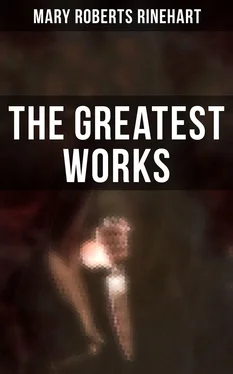We went out to inspect the property, and it seemed to deserve its name. Its cheerful appearance gave no indication whatever of anything out of the ordinary. Only one thing seemed unusual to me: the housekeeper, who had been left in charge, had moved from the house to the gardener's lodge, a few days before. As the lodge was far enough away from the house, it seemed to me that either fire or thieves could complete their work of destruction undisturbed. The property was an extensive one: the house on the top of a hill, which sloped away in great stretches of green lawn and clipped hedges, to the road; and across the valley, perhaps a couple of miles away, was the Greenwood Club House. Gertrude and Halsey were infatuated.
"Why, it's everything you want," Halsey said "View, air, good water and good roads. As for the house, it's big enough for a hospital, if it has a Queen Anne front and a Mary Anne back," which was ridiculous: it was pure Elizabethan.
Of course we took the place; it was not my idea of comfort, being much too large and sufficiently isolated to make the servant question serious. But I give myself credit for this: whatever has happened since, I never blamed Halsey and Gertrude for taking me there. And another thing: if the series of catastrophes there did nothing else, it taught me one thing—that somehow, somewhere, from perhaps a half-civilized ancestor who wore a sheepskin garment and trailed his food or his prey, I have in me the instinct of the chase. Were I a man I should be a trapper of criminals, trailing them as relentlessly as no doubt my sheepskin ancestor did his wild boar. But being an unmarried woman, with the handicap of my sex, my first acquaintance with crime will probably be my last. Indeed, it came near enough to being my last acquaintance with anything.
The property was owned by Paul Armstrong, the president of the Traders' Bank, who at the time we took the house was in the west with his wife and daughter, and a Doctor Walker, the Armstrong family physician. Halsey knew Louise Armstrong,—had been rather attentive to her the winter before, but as Halsey was always attentive to somebody, I had not thought of it seriously, although she was a charming girl. I knew of Mr. Armstrong only through his connection with the bank, where the children's money was largely invested, and through an ugly story about the son, Arnold Armstrong, who was reported to have forged his father's name, for a considerable amount, to some bank paper. However, the story had had no interest for me.
I cleared Halsey and Gertrude away to a house party, and moved out to Sunnyside the first of May. The roads were bad, but the trees were in leaf, and there were still tulips in the borders around the house. The arbutus was fragrant in the woods under the dead leaves, and on the way from the station, a short mile, while the car stuck in the mud, I found a bank showered with tiny forget-me-nots. The birds—don't ask me what kind; they all look alike to me, unless they have a hall mark of some bright color—the birds were chirping in the hedges, and everything breathed of peace. Liddy, who was born and bred on a brick pavement, got a little bit down-spirited when the crickets began to chirp, or scrape their legs together, or whatever it is they do, at twilight.
The first night passed quietly enough. I have always been grateful for that one night's peace; it shows what the country might be, under favorable circumstances. Never after that night did I put my head on my pillow with any assurance how long it would be there; or on my shoulders, for that matter.
On the following morning Liddy and Mrs. Ralston, my own housekeeper, had a difference of opinion, and Mrs. Ralston left on the eleven train. Just after luncheon, Burke, the butler, was taken unexpectedly with a pain in his right side, much worse when I was within hearing distance, and by afternoon he was started cityward. That night the cook's sister had a baby—the cook, seeing indecision in my face, made it twins on second thought—and, to be short, by noon the next day the household staff was down to Liddy and myself. And this in a house with twenty-two rooms and five baths!
Liddy wanted to go back to the city at once, but the milk-boy said that Thomas Johnson, the Armstrongs' colored butler, was working as a waiter at the Greenwood Club, and might come back. I have the usual scruples about coercing people's servants away, but few of us have any conscience regarding institutions or corporations—witness the way we beat railroads and street-car companies when we can—so I called up the club, and about eight o'clock Thomas Johnson came to see me. Poor Thomas!
Well, it ended by my engaging Thomas on the spot, at outrageous wages, and with permission to sleep in the gardener's lodge, empty since the house was rented. The old man—he was white-haired and a little stooped, but with an immense idea of his personal dignity—gave me his reasons hesitatingly.
"I ain't sayin' nothin', Mis' Innes," he said, with his hand on the door-knob, "but there's been goin's-on here this las' few months as ain't natchal. 'Tain't one thing an' 'tain't another—it's jest a door squealin' here, an' a winder closin' there, but when doors an' winders gets to cuttin' up capers and there's nobody nigh 'em, it's time Thomas Johnson sleeps somewhar's else."
Liddy, who seemed to be never more than ten feet away from me that night, and was afraid of her shadow in that great barn of a place, screamed a little, and turned a yellow-green. But I am not easily alarmed.
It was entirely in vain I represented to Thomas that we were alone, and that he would have to stay in the house that night. He was politely firm, but he would come over early the next morning, and if I gave him a key, he would come in time to get some sort of breakfast. I stood on the huge veranda and watched him shuffle along down the shadowy drive, with mingled feelings—irritation at his cowardice and thankfulness at getting him at all. I am not ashamed to say that I double-locked the hall door when I went in.
"You can lock up the rest of the house and go to bed, Liddy," I said severely. "You give me the creeps standing there. A woman of your age ought to have better sense." It usually braces Liddy to mention her age: she owns to forty—which is absurd. Her mother cooked for my grandfather, and Liddy must be at least as old as I. But that night she refused to brace.
"You're not going to ask me to lock up, Miss Rachel!" she quavered. "Why, there's a dozen French windows in the drawing-room and the billiard-room wing, and every one opens on a porch. And Mary Anne said that last night there was a man standing by the stable when she locked the kitchen door."
"Mary Anne was a fool," I said sternly. "If there had been a man there, she would have had him in the kitchen and been feeding him what was left from dinner, inside of an hour, from force of habit. Now don't be ridiculous. Lock up the house and go to bed. I am going to read."
But Liddy set her lips tight and stood still.
"I'm not going to bed," she said. "I am going to pack up, and to-morrow I am going to leave."
"You'll do nothing of the sort," I snapped. Liddy and I often desire to part company, but never at the same time. "If you are afraid, I will go with you, but for goodness' sake don't try to hide behind me."
The house was a typical summer residence on an extensive scale. Wherever possible, on the first floor, the architect had done away with partitions, using arches and columns instead. The effect was cool and spacious, but scarcely cozy. As Liddy and I went from one window to another, our voices echoed back at us uncomfortably. There was plenty of light—the electric plant down in the village supplied us—but there were long vistas of polished floor, and mirrors which reflected us from unexpected corners, until I felt some of Liddy's foolishness communicate itself to me.
Читать дальше












